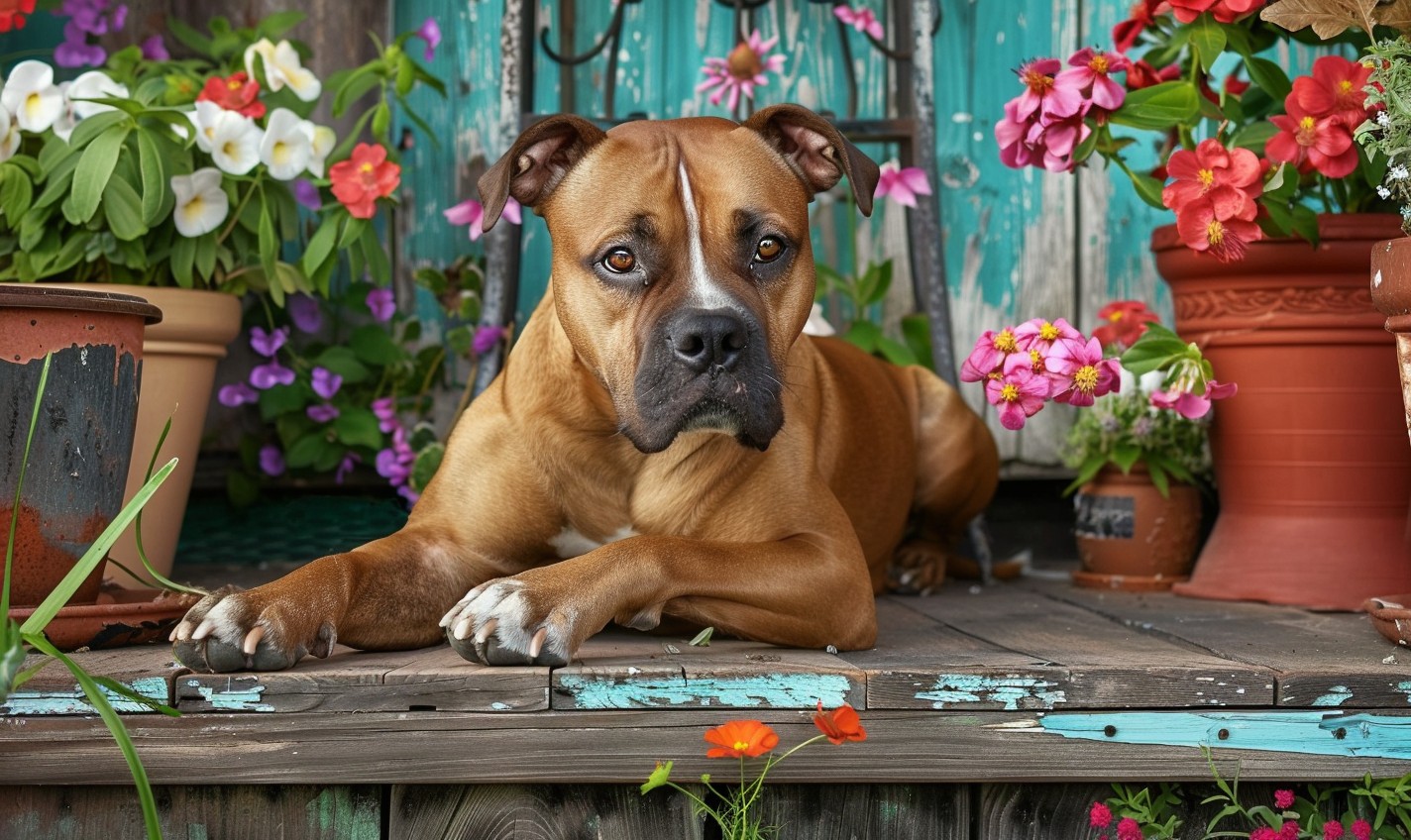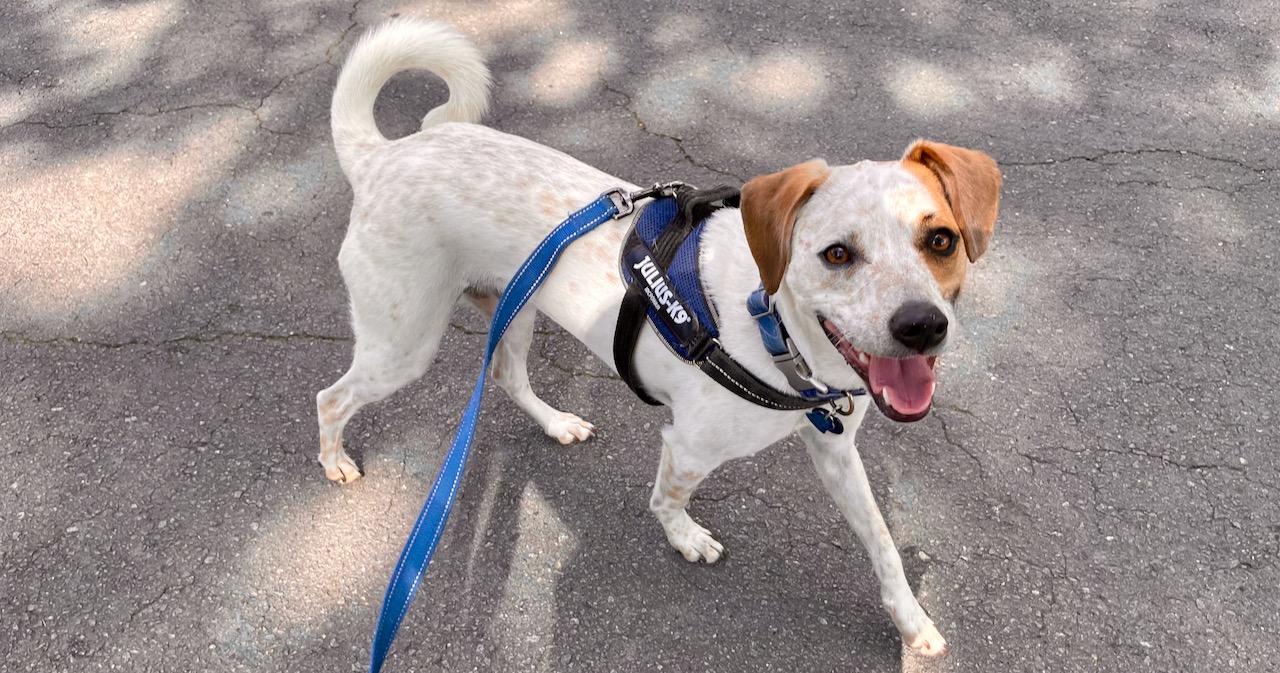The Bullboxer is currently one of the popular designer breeds out there, and with one look at them it’s easy to see why! This unique blend of boxer and bulldog results in a medium-sized dog that is not only a devoted companion but also an adaptable family pet with a personality that can range from clownish and playful to protective and loving. While they do love activity, they are also suitable apartment dogs as well. Let’s explore a little more to see if this breed may be a good fit for you!
BULLBOXER FAST FACTS
| Average Weight | 50- 80 lbs |
| Average Height | 22-26 in |
| Hypoallergenic? | no |
| Coat | short to medium, stiff fur |
| Shedding | little |
| Grooming | weekly |
| Barking | normal, can be often |
| Good with kids? | yes |
| Good with cats? | yes |
| Good with other dogs? | yes |
| Tolerates being alone | yes, but prefers a companion |
| Tolerates apartment life | yes |
| Training | quick learner but can be stubborn |
| People pleaser? | yes, very loyal |
| Exercise Needs | high |
| Health Concerns | breathing issues, skin issues, possible hip dysplasia |
| Life Span | 9-12 years |
| Average cost | $500-$1500 |
HISTORY AND ORIGIN OF THE BULLBOXER
The Bullboxer, sometimes known as a Boxerbull or Valley Bulldog, depending on the specific mix and region, embodies the best of both breeds, offering a perfect balance for those looking for a dog with both substance and spirit. This designer mix began right here in the United States, in the 1990’s. However, the term Valley Bulldog does have origins as far back as the mid 1900’s, originating in Nova Scotia Canada.
Owners of the parent breed, the English Bulldog and the Boxer combined these breeds to establish an active, medium sized dog.
They also hoped to reduce some health concerns in these two breeds. The demand for this new mix took off quickly since their temperament is so great!
PHYSICAL CHARACTERISTICS AND APPEARANCE
Let’s start with the English Bulldog…
These dogs are medium sized, with a heavy, low swung body, wide shoulders and strong legs. The breed is known for its short, smooth coat that comes in a variety of colors, including red, white, brown, and tan, often showcasing a distinctive brindle pattern.
Weighing in at approximately 40-50 lbs, these dogs present a formidable appearance, yet their physicality is balanced by their unique “rose ears” that fold inward, adding a gentle touch to their otherwise imposing presence. Their facial features are compact, marked by a very short face and muzzle, contributing to their distinctive look.

Now on to the Boxer…
With a coat that is short, sleek, and shiny, Boxers carry an air of athletic grace. Their broad muzzle is often accented with distinctive wrinkles across the forehead, adding character to their expressive faces. Unlike the Bulldog, Boxers feature ears that stand erect, contributing to their alert and vigilant demeanor.
Boxers have a powerful yet more refined physique compared to the stockier Bulldog, with a body that’s muscular but leans towards a more slender, less barrel-like shape. This breed stands on long, slender legs that not only underscore their strength but also their agility and grace. Their coat color ranges from tan to a deep mahogany, often adorned with a brindle pattern.

When you combine a Bulldog and a Boxer…
The Bullboxer combines physical traits from both parent breeds, resulting in a muscular and sturdy canine companion. These dogs typically weight between 50-80 lbs. They have broad shoulders, a hallmark of their robust build, which is complemented by a short, gleaming coat that comes in an array of colors including tan, brown, black, red, and white, often in a brindle pattern.
The face of a Bullboxer is characterized by a shorter muzzle with distinctive wrinkles that add an adorable expression of curiosity and attentiveness. Their ears are a unique blend of their lineage—pointed yet with a gentle droop, echoing the mixed inheritance of the Bulldog’s folded charm and the Boxer’s alert stance.
Standing taller than a Bulldog, Bullboxers inherit slightly longer legs from the Boxer side of the family, contributing to a more elevated stature and a stride that combines strength with agility. This feature not only enhances their athletic appearance but also suggests their capability for vigorous activity.
It’s important to note that the appearance of a Bullboxer can vary significantly, reflecting the predominant traits of the more dominant parent breed. This variability just adds to the unique charm of each Bullboxer, though!

BULLBOXER TEMPERAMENT
Let’s start with the English Bulldog again…
These dogs are loyal and kind. Originally used for bullbaiting, they began as what was meant to be a “ferocious” dog. However, when dog fighting became illegal (thankfully!), English Bulldog lovers were determined to preserve this breed.
With deliberate breeding choices over just a few generations, their notorious personality gave way to traits more valued in companions: loyalty, pride, and a gentle disposition. Today, Bulldogs are celebrated for their kind nature and strong family bonds.
Now on to the Boxer…
Similarly, the Boxer, once bred for its prowess in the fighting ring, has seen a major shift in temperament over the years. Known for their alertness and loyalty, Boxers are inherently playful and exude a friendly aura, especially around families.
This transition from a more “aggressive” heritage to a companionable demeanor highlights the breed’s capacity for change, marking Boxers as excellent pets renowned for their loyalty and playful nature.
When you combine a Bulldog and a Boxer…
A Bullboxer is a fantastic combination of the best parts of a Bulldog and a Boxer. Many owners will say their pups are silly and funny! These dogs are very intelligent and learn quickly! They are lively and social, and if they are acclimated to other dogs when they are young, they will enjoy the company of other canines in social situations.
They also love affection and build loyal bonds with their human families. They will love playing with children but should always be supervised, especially with younger kiddos, like with any dog! They typically get along well with other pets, like cats, especially if they are exposed to them from a young age.
They are also a great watch dog! As with all young dogs, be sure to expose them to various situations, people and surroundings. Having them feel comfortable with people, kids and other animals early on will help you raise a well rounded pup who is loved by all!
ARE BULLBOXERS EASY TO TRAIN?
Training your Bullboxer can be a rewarding experience, as this breed has a natural desire to please. While they may occasionally need a nudge to participate, their ultimate aim is to make you happy, making the training process smoother than you might expect.
It’s essential to approach training with a blend of firmness and positive reinforcement, as Bullboxers respond best to encouragement and rewards such as treats, praise, and play. Their willingness to please, combined with the right motivation, sets a solid foundation for a successful training regimen.
Introducing your Bullboxer to a puppy kindergarten is a fantastic idea. Early socialization and obedience training from a young age are crucial for developing a well-behaved adult dog. Despite their potential for stubbornness inherited from the Bulldog side, Bullboxers thrive under consistent and patient guidance. A bit of “tough love” paired with plenty of positive reinforcement can effectively encourage good behavior and adherence to training commands.
Remember, Bullboxers are not just eager to learn; they enjoy the process, especially when it strengthens their bond with you. Training sessions that are engaging and interactive will not only keep their attention but also cater to their physical and mental stimulation needs.
With a consistent, loving, and encouraging approach to training, your Bullboxer will grow into a well-rounded family member, adept in obedience and beyond, eager to please and a joy to be around.
COMMON HEALTH ISSUES FOR BULLBOXERS
As a rule, mixed breeds tend to be healthier than their purebred parents. But, there are a few things to watch for, including:
- Brachycephalic Syndrome: Due to the Bulldog’s influence, Bullboxers may inherit the brachycephalic skull shape, characterized by a shortened head and snout. This can lead to breathing difficulties, snoring, and overheating. Proper care, especially during hot weather, is essential to prevent respiratory distress.
- Hip Dysplasia: This is a genetic condition where the thigh bone doesn’t fit snugly into the hip joint, leading to arthritis or lameness. It’s common in medium to large breeds, including Bullboxers. Maintaining a healthy weight and regular, moderate exercise can help manage this condition. I also recommend incorporating a good hip and joint supplement into your dog’s daily routine.
- Skin Issues: Both Bulldogs and Boxers are known for their sensitive skin, which can be passed down to Bullboxers. This includes allergies, eczema, and other dermatological conditions that may manifest as itchiness, redness, or hair loss. Regular grooming and a diet rich in omega-3 fatty acids can support skin health.
- Cardiac Conditions: Boxers are particularly susceptible to heart conditions, such as aortic stenosis and boxer cardiomyopathy, which can also affect Bullboxers. Regular veterinary check-ups that include heart monitoring are crucial for early detection and management.
- Cancer: Unfortunately, Boxers are among the breeds with a high risk of cancer, and this risk can extend to Bullboxers. Early detection through regular vet visits can improve the management and outcomes of various forms of cancer.
Of course, it should go without saying that regular visits to the vet are key in preventing, and addressing, any health concerns that may come up.
CARING FOR YOUR BULLBOXER
Let’s go over some tips that will help you give your bullboxer the best life possible.
Exercise
Bullboxers are active dogs, so they require moderate to high activity each day. They will enjoy a daily walk as well as fetching a ball in the yard! Try to give them at least 60 minutes of moderate activity.
If socialized young, as mentioned earlier, these pups will love a trip to the dog park to burn some energy and make some friends!
Remember, they prefer a temperate climate, so shade in the heat and a sweater in the bitter cold will make them most comfortable!
Feeding
These dogs do need a hearty diet! But weight management is very important, as they are prone to gaining weight. Having a set meal time schedule is key.
Also, offering healthy snacks, recommended by your vet, and limiting treats will really help keep them at a healthy weight.
Looking for the best foods for your Bullboxer? Check out these posts for our favorite recommendations:
Grooming
Grooming for the Bullboxer is on the easier side. Their short coat is easy to brush and you really only need to do so about once a week. Make sure to use a dog shampoo when bathing them, probably about once a month. Bullboxer don’t shed a lot, but they do still shed. They are not considered a hypoallergenic breed.
If their ears do fold over, it’s important to keep them clean. Ask your vet to recommend some ear care steps.
Like all breeds, oral care is important! Brush with a dog toothpaste at least 2 times a week! Also, make sure to ask your vet about their recommendations for the best oral health for your pup! Make sure to also check their nails for length and cracks, keeping them short.
If you pup has wrinkles, check their folds daily and keep these areas clean and dry to make sure their skin stays healthy! A good all over body check is recommended weekly to make sure your little guy or gal is free from any irritations.
WHERE TO FIND BULLBOXER PUPPIES
I always recommend adopting your new best friend from a shelter! So many dogs need a second (or third…) forever home and these shelters are full of amazing pups who just want to be loved! There are a decent amount of Bullboxers in shelters, due to the popularity of mixing these breeds!
So, if you do have your heart set on this breed, definitely call or look at local shelters and rescues, and, with a little patience, you will most likely find one! PetFinder is a fantastic resource for starting your search to rescue your newest family member! You can also look for Bulldog or Boxer specific rescues, as they may have mix breeds too!
COST
While I always recommend adopting or rescuing (did I already mention that??…) if you’re planning to buy from a breeder, expect to pay anywhere from $500-$1500 for one of these pups. Just make sure to do your research! If you find a breeder, look them up online or even ask for references from previous families that have adopted from them. Check out where the puppies were raised, and how the parents are kept. If you see any red flags, like poor conditions, get out of there immediately (and please, report the breeder!).
Is a Bullboxer right for you?
Is the Bullboxer right for you? Only you can decide that! I will say, though, that these dogs make great family pets! They are loyal and playful. They will get along well with other animals and kids, especially if they grow up with them. And with some patience and positive reinforcement training, this mixed breed will be a fantastic addition to a family that loves to be active and share their love with this great pup!
Do you have a Bullboxer? Share your experiences and thoughts below!



